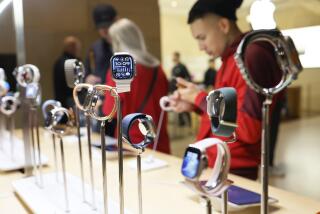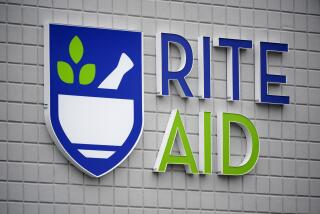FTC Won’t Require Dealers to Offer 30-Day Trial Period : Stiffer Hearing-Aid Sales Rules Rejected
- Share via
WASHINGTON — The Federal Trade Commission decided Monday not to impose new regulations on sales of hearing aids, and it moved to make life easier for supermarkets by permitting them to give rain checks when sale items run out.
The commission voted 4 to 1 to end its decade-long study of hearing-aid sales, dropping a proposed regulation that would have required sellers to give customers a 30-day trial period.
Commissioner George W. Douglas said a study found that most hearing-aid sellers already offer trial periods, making the rule and its enforcement unnecessary. Commissioner Patricia P. Bailey voted against dropping the rule, asking instead for a 90-day delay to collect more information.
In the supermarket case, the commission voted 5 to 0 to begin a formal proceeding to amend its rules governing advertising by food stores.
The current rules require a market to have enough stock on hand to meet any “reasonably anticipated” demand for items advertised for sale. Markets that run out of a product face fines of up to $10,000, and offering rain checks or substitutes--already a common, if unauthorized, practice among food stores--doesn’t get them off the hook.
Allow Special Sales
Non-food stores have long been permitted to offer rain checks or substitutes.
Also in line with other retail practice, the new rules for markets would allow special sales of products in limited supply. Food stores have not been able to advertise sales of close-outs or products such as fresh corn or other items when they get a limited amount because of the rule requiring them to be able to meet all anticipated demand.
Under the change proposed by the commission, markets would be able to have such sales, as long as the advertisement made it clear that supplies of the product were limited and that there is a chance that latecomers might be disappointed.
Supermarkets have sought to get the food advertising rules dropped or changed, contending that the costs of record-keeping, inventory storage and spoilage raise consumer prices by more than is saved in having advertised items available.
That argument was bolstered by an FTC study last year that estimated costs of the regulation at $200 million annually, compared to consumer savings of $125 million.
However, when changes were proposed, thousands of consumers wrote the commission expressing their concerns. Many feared that the rules banning “bait-and-switch” advertising would be eliminated, and others wrote favoring rain checks.
Bait-and-switch advertising, in which a merchant advertises a product at a low price and then tells the buyer its not available and tries to push a more costly item, is covered by other regulations and will remain illegal.
While the unanimous vote indicates that the new food advertising regulations are likely to become final, it will be at least three months--and probably longer--before they can take effect, because of the legal procedures that must be followed.
More than 90% of U.S. supermarkets already offer rain checks, and nearly as many provide substitute items when they run out of a product, according to a commission survey. Although that technically violates the current regulations, no one has been prosecuted since 1977.
In the hearing-aid case, Bailey had asked that the decision be deferred because the American Assn. of Retired Persons and the American Speech-Language-Hearing Assn. had sought to complete surveys of their members to use in commenting on the proposed regulation.
Chairman James C. Miller III responded that the commission will keep a close eye on the industry and will take action against individual firms that mislead customers.
But, considering the fact that most hearing-aid customers report being satisfied with their purchases and the length of the research so far, he felt that the action should be ended.
More to Read
Inside the business of entertainment
The Wide Shot brings you news, analysis and insights on everything from streaming wars to production — and what it all means for the future.
You may occasionally receive promotional content from the Los Angeles Times.










